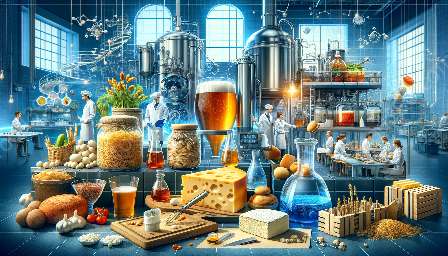Yeast fermentation is a fascinating process that plays a crucial role in the realms of fermentation science and food & drink. This natural biochemical reaction, driven by yeast organisms, contributes to the creation of a diverse range of food and drink products, each with its unique flavors, textures, and aromas.
The Science Behind Yeast Fermentation
At its core, yeast fermentation is a metabolic process by which yeast organisms convert sugars into alcohol and carbon dioxide. This biochemical reaction, known as alcoholic fermentation, occurs in the absence of oxygen, making yeast an essential component in various fermentation processes, including those used in the production of alcoholic beverages such as beer, wine, and spirits.
Yeast, a single-celled fungus, is a versatile microorganism that can thrive in various environments, making it an ideal candidate for fermentation processes. The most common yeast species used in fermentation applications include Saccharomyces cerevisiae and Saccharomyces pastorianus, each contributing distinct characteristics to the end products.
The Role of Yeast in Fermentation
Yeast fermentation is integral to the creation of numerous food and drink products, offering benefits beyond alcohol production. In the realm of fermentation science, yeast plays a fundamental role in the transformation of raw ingredients into flavorful and preserved goods, with applications spanning from bread-making to the production of fermented dairy products.
The key mechanism by which yeast drives fermentation is through the conversion of carbohydrates, primarily sugars, into alcohol and carbon dioxide. This process not only results in the production of alcoholic beverages but also influences the texture, flavor, and shelf life of various food products.
Applications of Yeast Fermentation in Food & Drink
The impact of yeast fermentation extends to a myriad of food and drink categories, influencing the final characteristics of each product. Notable applications of yeast fermentation include:
- Beer Brewing: Yeast fermentation is central to the production of beer, contributing to its alcohol content and imparting specific flavors and aromas based on the yeast strain used and fermentation conditions.
- Wine Making: In the realm of oenology, yeast plays a crucial role in winemaking, where specific strains are selected to ferment grape sugars into alcohol, ultimately defining the sensory profile of the wine.
- Bread Baking: The leavening of bread through yeast fermentation yields risen and airy loaves, with the carbon dioxide produced by the yeast contributing to the formation of the bread's structure and texture.
- Cheese and Dairy Fermentation: Certain cheese and dairy products undergo fermentation initiated by yeast, contributing to the development of unique flavors and textures in aged cheeses and cultured dairy products.
- Fermented Beverages: Beyond alcoholic drinks, yeast fermentation is harnessed in the production of fermented beverages such as kombucha and kefir, where yeast and symbiotic cultures contribute to the creation of distinct and probiotic-rich drinks.
Advancements in Yeast Fermentation Technology
With the advancements in fermentation science and technology, the understanding and manipulation of yeast fermentation have evolved, leading to innovative techniques and applications in the food and drink industry. This has facilitated the production of novel and high-quality products, catering to evolving consumer preferences and expanding culinary landscapes.
In recent years, genetic engineering and biotechnological approaches have enabled the modification of yeast strains, enhancing their performance in fermentation processes, and even yielding yeast-based protein alternatives, addressing the growing demand for sustainable food sources.
The Future of Yeast Fermentation in Food & Drink
As the intersection of fermentation science and culinary arts continues to inspire innovation, yeast fermentation remains at the forefront of this dynamic landscape. With ongoing research and development, the potential applications of yeast fermentation in food and drink are poised to expand further, offering new avenues for flavor exploration, sustainability, and nutritional enhancement.
The integration of modern techniques, such as precision fermentation and bioprocessing, is anticipated to open doors to previously unexplored possibilities, driving the creation of next-generation food and drink experiences rooted in the science of yeast fermentation.

